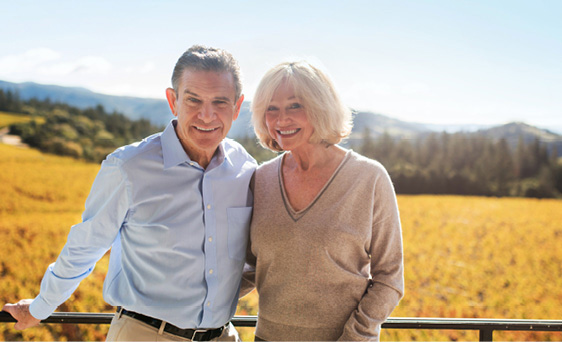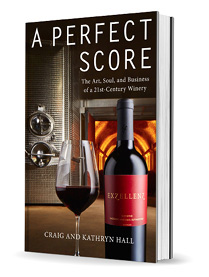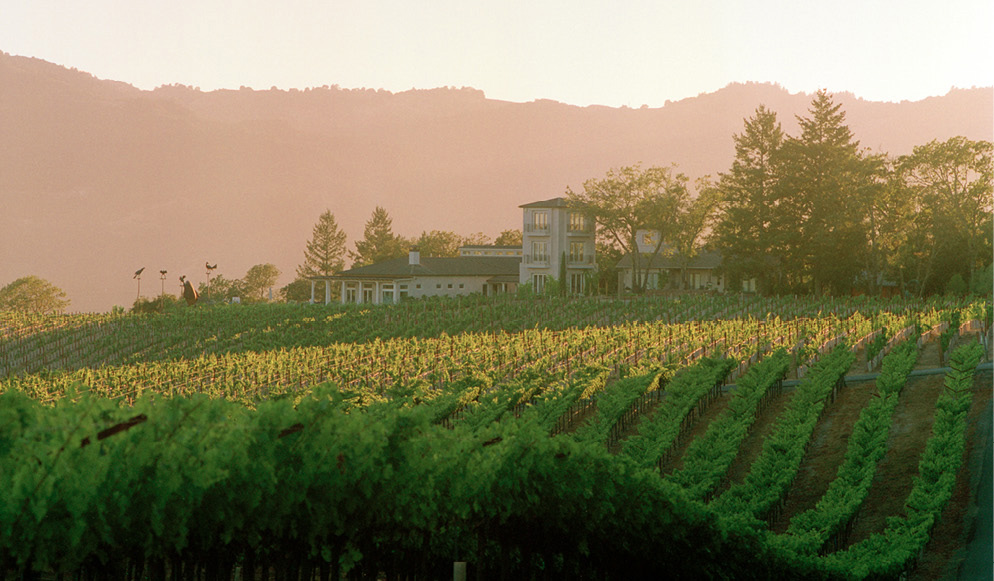Calling Kathryn and Craig Hall go-getters is an understatement. She is a lawyer, the former U.S. Ambassador to Austria and ran for mayor of Dallas in the ’90s; he is the founder of Hall Financial Group, a real estate developer and a former part-owner of the Dallas Cowboys.
 JUSTINE DI FEDE
JUSTINE DI FEDE
Kathryn, who grew up in the San Francisco Bay Area, always wanted a winery. Craig isn’t one to shy away from a challenge. In 1995, the couple purchased a vineyard in Napa Valley, California, and launched Hall Wines in 2002. The following year, they added the 1885 Bergfeld winery and vineyard. Hall Wines now includes seven vineyards and produces hundreds of wines—two of which received 100-point scores from wine critic Robert Parker. The duo wrote A Perfect Score, out in September, which details the history of their winery. Craig—who splits his time between Dallas and Napa Valley—discusses how they found success in a competitive market.
Related: Top of Mind: 6 Ways to Stay Ahead of the Competition
Q: What inspired you to launch your winery?
A: There are two short answers. First, love, and second, challenge. My wife’s family had a vineyard when she grew up in the Bay Area. After her parents passed away, there was a time when she, her brother and her sister jointly owned it, and then they went to divide it up. Her brother wanted it and she wanted it, and I said, “Give it to your brother, and we’ll find another one.” That started us on the journey of trying to find the best vineyard property in the U.S.
It’s an easy business to fail in and a hard business to succeed in. So I thought it would be fun. I like challenges.
The challenge is that there are very few businesses I can think of as an entrepreneur that are more complicated, have more moving parts and are more difficult than making and selling high-end wine. You’ve got farming, manufacturing, marketing, customer relations and experience. It’s an easy business to fail in and a hard business to succeed in. So I thought it would be fun. I like challenges.
Q: What was the biggest obstacle you faced when you launched your winery and how did you overcome it?
A: We had several big obstacles along the way. Selling wine in the early days proved to be much more challenging than we anticipated. Our biggest obstacle appeared in 2009, when we were under construction expanding our winery. We had too much wine in inventory, and our bank refused to loan us more money. One could say that at that moment in 2009, we were very stretched, between construction we couldn’t afford and inventory that wouldn’t sell. It felt like a pretty desperate time.
 JUSTINE DI FEDE
JUSTINE DI FEDE
We went on to raise $55 million from investor partners who loaned us money like preferred stock. As it has turned out, we’ve done well financially, and the investors have also done well. We ended up selling a lot of the oversupply of wine inventory to airlines in first-class flights to Asia and Europe, and in turn, gained many new customers. All of the obstacles and negatives became positives, but it sure didn’t seem like it while we were going through it.
Q: How did you get people to know and trust your brand?
A: When we first started, we had lots of setbacks and years when the wine wasn’t worthy and we weren’t special. I would never suggest to anyone that there’s a silver bullet. There’s not any one thing that works in wine. My comment to our staff is always, “No shortcuts, no excuses.” You’ve got to do everything right. There are a huge amount of moving parts and a lot of different things to making good wine, then getting it sold and into the right hands, where people buy more and get their friends to buy it. It’s a hard but great, fun and rewarding business.
Q: How did you feel when you received a perfect score from wine critic Robert Parker?
A: It was incredibly exciting—to get 100 points on a wine is what everybody strives for. I realized right away that there’s no such thing as a perfect wine, it’s only a perfect score. It’s nice to have, but at the same time, the next day you get up and you try to make a better wine. We now have two 100-point scores and we have a couple hundred over-90-point scores.
That’s all nice, but what’s more important are the stories. I went into a store a year or so ago and somebody saw I had a Hall Wines shirt on and she said, “Are you with them? I love your merlot. Your merlot changed my life.” I was walking on cloud nine. To me, that was sort of the same thing as getting a perfect score because the perfect score is a critic’s way to say this is really good, but almost more important is what any one individual thinks.
Q: How did you manage to succeed in such a competitive market?
A: The wine business is one of the most entrepreneurial and, in turn, one of the most competitive and risky. A lot of people get into the wine business for the wrong reasons. They think it will be romantic and fun, but it is also hard, complex and made up of a ton of moving parts. We were fortunate and able to succeed because of several factors. When we began, we had accepted that this was not a traditional business. We have always believed wine is about making a difference in people’s lives with a great-tasting product and great experiences. We put quality and experience first.
Q: What is the most rewarding aspect of running Hall Wines?
A: I’m constantly amazed at how wine affects people’s lives and how people associate wine with experiences. You don’t have a beer moment—you have a wine moment. You think about this great glass of wine you were having, and where you were, and what was going on. It has a lot to do with people’s enjoyment of life.
Related: 3 Pieces of Advice for First-Time Entrepreneurs
This article originally appeared in the September 2016 issue of SUCCESS magazine.


